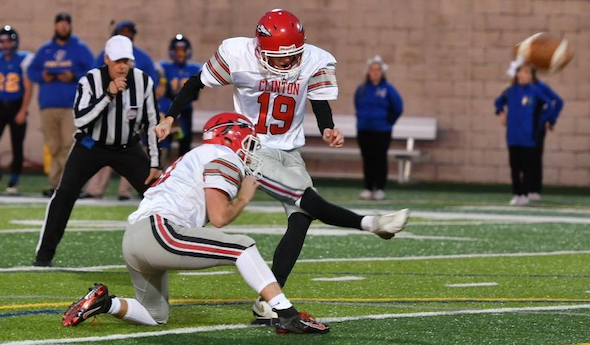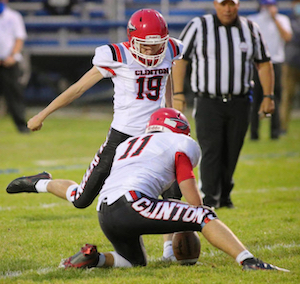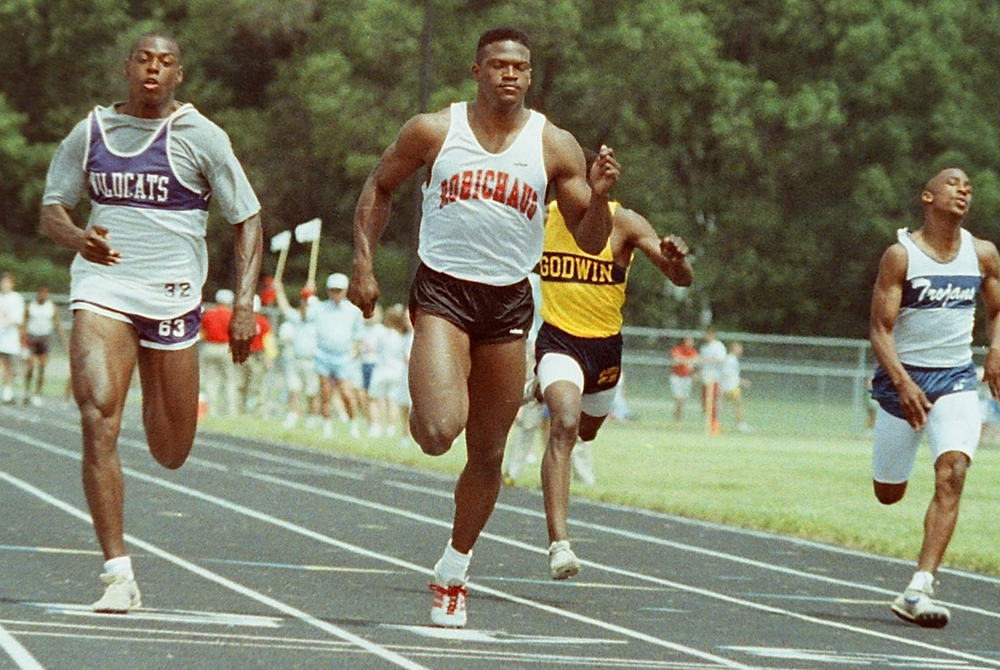
Kicker Steps Into Historic Moment
December 8, 2020
By Doug Donnelly
Special for Second Half
CLINTON – After what Jonathan Baughey has gone through, kicking a football through two yellow goal posts doesn’t seem like a very big deal.

But, when it came against an undefeated, state-ranked team on the last play of the Division 6 District championship game, it was just that.
“It was definitely a scary moment,” said Baughey, a junior from Clinton High School in Lenawee County.
Baughey’s 22-yard field goal as time expired gave Clinton a 16-13 victory over Blissfield and sent his team into a Regional Final against Warren Michigan Collegiate.
It’s been a long road for Baughey, who thought that after a successful kidney transplant in 2015 that his football career was over. At the urging of a family friend and Clinton middle school coach, however, Baughey tried kicking. It was a good choice as he’s now etched his name into Clinton football lore by making probably the biggest field goal in school history.
 “He’s been through so much, and I couldn’t be happier for him,” said Clinton football coach Jeremy Fielder. “We had a lot confidence in him kicking in that situation. There was no hesitation.”
“He’s been through so much, and I couldn’t be happier for him,” said Clinton football coach Jeremy Fielder. “We had a lot confidence in him kicking in that situation. There was no hesitation.”
Baughey was born with one kidney functioning at 25 percent and the other at 75.
“From birth he always had kidney issues,” said his mother, Kelly Baughey. “We knew growing up he would need a transplant. They tested his father and I, and we were both matches. His dad (Kevin) decided that he wanted to do it for him. He was his donor.”
Kevin Baughey never hesitated.
“It wasn’t a decision at all,” he said. “I would have given him both if I needed to.”
For years, dealing with the kidney issue was just part of Jonathan’s life. He would tire easier than other kids, but he learned to cope with it.
“I was more of a tired kid,” Baughey said. “When I was younger, it wasn’t about contact, it was about how tired I would get. I couldn’t keep up with a lot of other kids. It was hard.”
He had a kidney removed in December of 2012. After that, he said, “it was a roller coaster.” The transplant didn’t come until June of 2015, soon after he finished the sixth grade.
It took roughly six weeks in the hospital for Baughey to recover from the transplant.
“As soon as I had the transplant, I started feeling better than I had felt,” he said. “I had more energy.”
Baughey played flag football as a kid and had started playing tackle football. But when he neared the time for a transplant, he figured his football days were done. That’s when family friend and Clinton middle school coach Keith Tschirhart suggested he try kicking for the Clinton middle school team.
“I had played soccer and thought it was something I could do, so I tried it,” Baughey said. “I went out with him to the football field to see how I would do. It was pretty rough at the beginning. It took some time.”
He didn’t get much practice that first season.
“We never really kicked extra points,” he said.
Baughey kept working at it though and made it through his eighth-grade season. As a freshman he figured he would continue kicking, most likely for the Clinton JV team. He went to the tryouts.
“I kicked my first football and the coach said I was on the varsity,” he said.
Fielder said Baughey made an immediate impact.
“We didn’t have a kicker,” he said. “We had no one. I even told the coaches, ‘What are we going to do?’ Then, I saw him kick the ball and it was like, ‘He’s our kicker.’”
 It was big adjustment for Baughey. Not only had he once thought he would never play football again – but he found himself suddenly on the varsity as a freshman, not knowing anyone on the team. And, being exclusively a kicker, meant he practiced mainly by himself.
It was big adjustment for Baughey. Not only had he once thought he would never play football again – but he found himself suddenly on the varsity as a freshman, not knowing anyone on the team. And, being exclusively a kicker, meant he practiced mainly by himself.
“That was the struggle that I went through,” he said. “I didn’t know anyone. The only kids I knew were the snapper and the holder.”
Clinton grad Erik Bouse stepped in to help Baughey. Bouse had been a standout kicker for Clinton for three seasons before graduating in 2017.
“He was the one who I mainly worked with,” Baughey said. “He helped me a lot. He really started me out not creating bad habits and helped with the mental part of it.”
As a freshman, Baughey made 42 of his 50 extra-point attempts and a 21-yard field goal. As a sophomore he made 48 of 54 with a 19-yard field goal. This season he has made 29 of 37 extra-point attempts. The winning field goal against Blissfield was his only field goal of the season, on two tries.
Baughey is exclusively a kicker because of the potential risk of injury following the transplant. He wears a special pad on his stomach under his uniform because that is where doctors put his new kidney.
His mother said the no-contact rule causes some angst for her.
“He knows there is a chance he could get hit,” she said. “He wears a shield for padding. The transplant team has okayed him to play.”
Baughey practices every day, often by himself. He goes to the game field and starts at the extra point yardage and works his way back, making at least two kicks at each distance before moving on to the next level. He’ll use his cell phone to record himself, then watch the videos to make sure he is kicking correctly and not developing bad habits.
“The biggest part for me is to go out and know that I can do it,” he said. “You have to know you are going to kick it through the uprights, not just think you are going to. I like to pick out a small target, even a leaf or something, and just clear my mind and just kick the ball.”
When Clinton got the ball back with just over three minutes to go in the District Final against Blissfield, Baughey started thinking the game might come down to his foot.
“I went to the net and started kicking,” he said.
Clinton drove the ball inside the Blissfield 10-yard line, but did not reach the end zone. Fielder called a timeout on fourth down with only a few seconds left. Baughey jogged onto the field and lined up when Blissfield called a timeout.
“I remember walking to the sidelines and taking a deep breath,” he said. “People came up and talked to me and told me I could do it”
Baughey blocked everything out.
“I was really mentally focused,” he said. “After I made the kick, I started clapping. I turned around and all my teammates were jumping up and down. I ran to our coaches and everyone started hugging.”
His father, his donor, could not have been happier to see the ball go through the uprights.
“I was beside myself happy,” Kevin Baughey said. “Thinking about all of the time he spent working in the offseason, and then seeing the confidence his coaches showed with making the call to go for the field goal ... I was as proud as I could possibly be.”
 Doug Donnelly has served as a sports and news reporter and city editor over 25 years, writing for the Daily Chief-Union in Upper Sandusky, Ohio from 1992-1995, the Monroe Evening News from 1995-2012 and the Adrian Daily Telegram since 2013. He's also written a book on high school basketball in Monroe County and compiles record books for various schools in southeast Michigan. E-mail him at [email protected] with story ideas for Jackson, Washtenaw, Hillsdale, Lenawee and Monroe counties.
Doug Donnelly has served as a sports and news reporter and city editor over 25 years, writing for the Daily Chief-Union in Upper Sandusky, Ohio from 1992-1995, the Monroe Evening News from 1995-2012 and the Adrian Daily Telegram since 2013. He's also written a book on high school basketball in Monroe County and compiles record books for various schools in southeast Michigan. E-mail him at [email protected] with story ideas for Jackson, Washtenaw, Hillsdale, Lenawee and Monroe counties.
PHOTOS: (Top) Clinton's Jonathan Baughey connects on a kick. (Middle) Baughey, following through on another kick this season, clinched his team's District title with a game-winning field goal. (Photos courtesy of the Clinton football program.)

Robichaud 3-Sport Legend Wheatley Selected to National High School Hall of Fame
By
Geoff Kimmerly
MHSAA.com senior editor
March 11, 2024
The playing career of 1991 Dearborn Heights Robichaud graduate Tyrone Wheatley remains one of the most storied in Michigan high school sports history. His prestige gained during that early stage of his athletic stardom has been recognized nationally as well, as Wheatley was one of 12 honorees announced today as this year’s inductees into the National High School Hall of Fame by the National Federation of State High School Associations (NFHS).
Wheatley – who grew up in Inkster and is currently the head football coach at Wayne State University – will be inducted as one of 11 honorees selected for the 41st Hall of Fame class at a ceremony during the NFHS summer meeting July 1 in Boston. The rest of the class is made up of three more athletes, four coaches, two former state association administrators and a game official. Wheatley was nominated by the Michigan High School Athletic Association.
Wheatley will become the Hall of Fame’s 10th inductee from Michigan, joining the MHSAA’s first full-time Executive Director Charles E. Forsythe (inducted 1983), River Rouge boys basketball coach Lofton Greene (1986), Warren Regina athletic director, softball and basketball coach Diane Laffey (2000), Fennville basketball and baseball standout Richie Jordan (2001), Grosse Pointe Woods University Liggett boys and girls tennis coach Bob Wood (2005), Bloomfield Hills Cranbrook hockey standout Jim Johnson (2007), Owosso football, basketball and baseball all-stater Brad Van Pelt (2011); Vermontville Maple Valley baseball national record holder Ken Beardslee (2016) and retired MHSAA Executive Director John E. “Jack” Roberts (2022).
To the greater public, Wheatley surely is best known as a star running back for University of Michigan who went on to play 10 seasons in the NFL for the New York Giants and Oakland Raiders. However, he is arguably most glorified in Michigan high school athletics for his accomplishments on the track, where as a junior in 1990 he became the first (of still only two) athletes to win four individual events at an MHSAA Lower Peninsula Finals – placing first in the 100 and 200-meter dashes, 110-meter hurdles and long jump. He led Robichaud to the Class B team title that day, scoring 40 of its 49 points. Wheatley completed his high school career in 1991 with three more Class B individual track & field championships and nine total over his final three seasons; he was injured in the 100 during that senior-year meet and could not run his final race to attempt another four-title day.
Wheatley’s meet records of 13.7 seconds in the 100 at the 1991 LP Class B Final and 23-10¾ in long jump in 1989 still stood when the four-Class track & field format was retired after the 1999 season. He also remains the only athlete to win the 100 three times at the prestigious Mehock Relays in Mansfield, Ohio, also finishing first in the 110 hurdles and 200 and runner-up in the long jump at that meet in 1991.
Wheatley was similarly accomplished on the high school football field, leading his team to a state championship in 1990 and earning a Parade All-America honor. Over three varsity seasons total he ran for a combined 4,257 yards and 67 touchdowns, including 2,010 yards and 33 scores on 208 carries as a senior in 1990 – the latter despite playing quarterback half of that season (and throwing five touchdown passes). He played quarterback, running back, defensive back, punter, kicker and returned kicks, and he scored 252 points over 13 games as a senior and 484 over 38 career games.
Wheatley also was a standout on the basketball court for Robichaud, averaging 14 points and 16 rebounds per game as a senior in earning all-state recognition in that sport as well.
“My city where I come from, Inkster, means the world to me. I grew up in an incredible era of sports in Michigan (with successful University of Michigan and Detroit pro teams) … but if you ask me who my idols were, they were the guys I grew up with playing on the playground,” Wheatley said. “After you come from a basketball game where you see Jarvis Walker drop 30, or Earl Jones running the last 200 of a race backwards … you hear people talk about them, you hear their reverence about them, and I just wanted to be put in the conversation of the best to come out of Inkster, forget the state. I can tell you this for sure: I’m not the best athlete to come out of Inkster, just the person who got the recognition. And my foundation was built watching, taking notes, preparing, working out and just trying to be one of the guys.
“(Robichaud was) the step. Because without Robichaud … Michigan, the NFL, me coming back to coach, it doesn’t happen,” Wheatley said. “Without the Robert Yaucks (his football coach at Robichaud), the Coach (Leit) Jones (his Robichaud track coach), the Coach (Mercer) Brysons, the (coach) Wade Cooks, the (coach Jeff) Flounorys, the Millie Hursins (his academic advisor) of the world, this doesn’t happen. Without my high school teammates, none of this happens. So it’s not just a step. What’s the saying – the first impression is the lasting and best impression? Robichaud was it.”
Wheatley returned to Robichaud as its varsity football coach in 2007 and led that team to a 9-2 record and the MHSAA Playoffs for the first time since 1994 – after Robichaud had finished 0-9 the previous season. He has served as an assistant football coach at four college programs including U-M and Syracuse, and with the Buffalo Bills, Jacksonville Jaguars and Denver Broncos.
He also served as Morgan State University's head coach from 2019-21 and just completed his first season as head coach at Wayne State, which finished 3-8 – an improvement of two wins from 2022 and the program’s best record since 2019.
Wheatley graduated from University of Michigan in 2008 with a bachelor’s degree in kinesiology. He and wife Kimberly have five children: Tyrone Jr., Terius, Tyrique, Tiana and Tamari. Tyrone Jr., an offensive tackle, played this past season for the New England Patriots.
“Many of us who grew up in Michigan grew up as fans of Tyrone Wheatley because of what he accomplished at the college level – but his legendary story begins at Dearborn Heights Robichaud, where his outsized athletic ability was on full display in every sport he played,” MHSAA Executive Director Mark Uyl said. “Michigan has produced several professional athletes in a variety of sports and nearly 50 Olympians in track & field alone, and what Tyrone Wheatley achieved as a high school athlete remains a standard few have approached. We are ecstatic that he will deservedly take his place among the all-time elite high school athletes nationally as well.”
The National High School Hall of Fame was started in 1982 by the NFHS. The 11 individuals were chosen after a two-level selection process involving a screening committee composed of active high school state association administrators, coaches and officials, and a final selection committee composed of coaches, former athletes, state association officials, media representatives and educational leaders. Nominations were made through NFHS member associations. Also chosen for this class were athletes Joe Mauer (Minnesota), Takeo Spikes (Georgia) and Dot Ford Burrow (Mississippi); sport coaches Paula Kirkland (South Carolina), Gary Rankin (Tennessee), Roy Snyder (Pennsylvania) and Ronald Vincent (North Carolina); former state association administrators Mike Colbrese (Washington) and Marie Ishida (California), and baseball/football game official David Core (Oklahoma).
For more on this year’s Hall of Fame class, visit the NFHS Website.
PHOTO Tyrone Wheatley crosses the finish line first during one of his nine MHSAA Finals track & field championship victories. (MHSAA file photo.)

